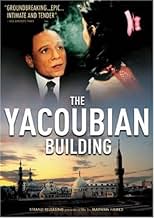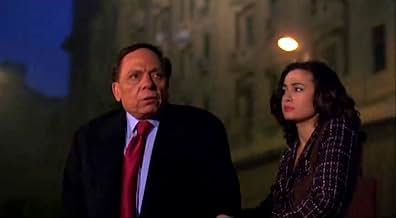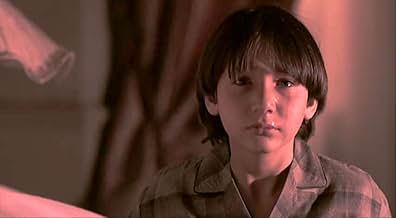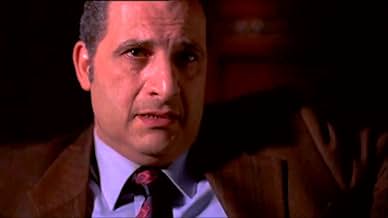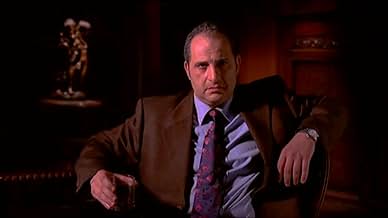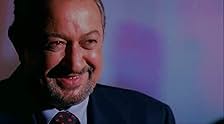NOTE IMDb
7,5/10
7,6 k
MA NOTE
Ajouter une intrigue dans votre langueMeditations on corruption, fundamentalism, prostitution, homosexuality, and drugs in central Cairo.Meditations on corruption, fundamentalism, prostitution, homosexuality, and drugs in central Cairo.Meditations on corruption, fundamentalism, prostitution, homosexuality, and drugs in central Cairo.
- Réalisation
- Scénario
- Casting principal
- Récompenses
- 9 victoires et 5 nominations au total
Esaad Younis
- Dawlat El Dessouky
- (as Issad Younis)
Ahmad Bedair
- Malaak
- (as Ahmed Bedeir)
Hind Sabri
- Bothayna
- (as Hind Sabry)
Khaled El-Sawi
- Hatem Rachid
- (as Khaled El Sawy)
Basem Samrah
- Abd Raboh
- (as Bassem Samra)
Mohamed Emam
- Taha El Shazly
- (as Mohamed Imam)
Youssef Dawood
- Fekry Abdel Shaheed
- (as Youseff Daoud)
Talaat Zakaria
- Bar Owner
- (as Talat Zakariyya)
Avis à la une
This movie is no different from any other Oscar winning film. What I have witnessed is far beyond any Egyptian movie. This film has successfully captured all of the dysfunctional aspects of Egyptian society, squeezed taboos to the last drop, and left the audience laughing from the heart. I expected it to be good but not this good it's amazing go watch it, support decent movies for a change. 3 hours but couldn't keep my eyes off of it. I'm really hoping that this film wins an Oscar to show Egyptian film makers that hard work does pay off. Films like zay elhawa and elghawas should not be in theaters, unless products contain effort, the audience should not have to put up with it.
I read the story of Yacoubian Building so I couldn't wait to watch it in the movie theater but I thought it will be like any other story. not as good as the book. I just loved this movie.. the Casting was so genius and every actor did his part in an amazing way. The Old Classic ones and the new generation. Even Mohamed Emam. this is his first movie and he was able to make me believe in him. This movie should be nominated for an Oscar. Even the soundtrack, the picture and the dialog just so good. this movie had me thinking all night about it and made me live it. this movie made me laugh, cry, bothered, It is a masterpiece. I just hope the movie industry in Egypt keeps on bringing those types of movies. those movies which remind us of the 70's movies where at least 2 or 3 big movies stars act together. Now I'm thinking to take the rest of my friends to it so i can be able to watch it second time. It is one of the best movies I've watched this year.
"They" say it's overly faithful to the bestselling novel by Alaa Al Aswany which I have not read. . For Egypt, Yacoubian Building is the most expensive film ever (quotes vary). Director Hamid was 28 when he made it and is the son of the screenwriter who did the adaptation. The film is an ambitious and promising if under-edited piece. Perhaps it ought to have been in parts like Marco Tullio Giordana's The Best of Youth/La meglio gioventù, to which it has been compared. But instead it's a somewhat sprawling 172 minutes and feels at times like a smashed-together telenovela.
Hollywood Reporter says the film may "offer a revealing window into the secular world of a modern Islamic country -- its indulgence in alcohol, sexual promiscuity, political corruption and personal betrayals. From such 'deformities, the movie argues, Islamic fundamentalism gains its most passionate adherents." But we can do better than this crude analysis. Moroccan-born ,western educated novelist Laila Lalani points out the book (and consequently the movie) is full of prejudices against gays, resembles the old "large-scale melodramas" produced by Egypt's "huge film industry," with their "young idealists, desirable ingénues, old predators, and so on," and is crudely moralistic -- with almost every character forced to make choices that "ultimately result in either their downfall or redemption." It's also full of heavy-handed emotional manipulation, cliff-hangers, and so on. Alaa Al Aswany is no Naguib Mahfouz. Aside from the prejudice against gays, we're told that mixed marriages produce confused children, that all women love sex enormously, and so on. It's important to realize that however engaging the film is and notable the actors are in the Egyptian film world, it's made out of dross, not gold.
The titular Armenian-owned, Twenties Yacoubian Building in the once elegant, restricted central zone of the city "became home to Cairo's rich and powerful when it opened," Lalani writes. After the revolution, however, "storage sheds on the rooftop were rented out to poor families--a sort of sky-high slum." This allows for a story about the building's residents that spans society. The action is set in the 1990's. And the basic panorama goes something like this:
In the foreground is Zaki Bey El Dessouki, or "Zaki Pasha" (Adel Imam), a superannuated playboy kicked out of the family apartment by his mean, half-crazy sister. He may seem seedy, but he's the house aristocrat. Fanous (Ahmed Rateb) is his faithful manservant. Dawlat (Essad Younis) is his nutty, vindictive sister, who has always resented his fun loving ways and not is out to get him. Hatem Rasheed (Khaled El Sawy) is a gay editor who takes a good-looking soldier Abd Raboh (Bassem Samra) .from the country as his lover. Rasheed isn't mincing, but he reflects an Egyptian discomfort with gayness; still, he's seen three-dimensionally. He likes dark Nubian men because they remind him an early experience with a family servant. The film's treatment of the sexual aspect of Hatem's relationship to the soldier feels like something made in the 1950's. In general sex is a burden for the people in this movie, either a risky temptation or an ordeal. It gets nasty, and then the camera shrinks away.
Haj Assam (Nour El Sheriff) is a self-made millionaire (through a chain of stores selling modestly-priced women's clothing) with political ambitious. wants to get into the People's Assembly (Majlis al Sha'ab) for access to power. He takes a penniless young widow with a young son, Soad (Somaya el Khashab), as a second wife and forces her to have an abortion. As Lalani puts it, Assam "is the nouveau riche to Zaki' Bey's aristocrat." The brothers Abaskharon and Malaak (Ahmed Bedire) are Coptic Christians who save every penny they make, by legal and illegal means, in order to finally afford a room on the roof.
On the roof are Taha (Mohamed Imam)and Buthayna (Hind Sabry). Taha is the son of a bawab. A bawab is a doorkeeper, more like a concierge or a super in New York rather than "janitor" as it's translated. With such a lowly father, Taha is turned down by the police academy as not socially adequate to become an officer, and adopts a "plan B," to major in political science, which leads him to sympathy with the university religions fanatics and he eventually becomes an Islamic fundamentalist. His girlfriend Buthayna leaves him when he becomes religious and eventually she goes to work for Zaki, who's reformed and treats her well. She's previously been sexually harassed in every job she's had -- as we're shown in a lurid scene. Perhaps she feels too defiled to be worthy of one so innocent and decent as Taha, and she seems hardened A reader has pointed out that she is much poorer in the book than here. Laila Lalani says, "Egypt's young men are easy preys to religious extremism while the country's young women are victims of sexual exploitation." Taha is imprisoned and given Abu Ghraib treatment that de-islamicizes him. To get revenge, he trains as a terrorist -- a chain of events that looks frighteningly up-to-date.
The film has little details any Cairo downtown resident will know -- like Zaki yelling angrily because another resident has left the door of the antique elevator open on their floor so no one else can use it. Though this isn't Naguib Mahfouz, like him it attempts to draw a richly representative picture of a whole society. It's a rather sad picture with its disapproval of the present and nostalgia for the past.. And again, despite the three or six million dollars spent, some exterior sound is awful, the wrong kind of lens is used to pan up and down the city buildings, and some of the Islamicists' beards look pasted on. But with all that's going on, it holds your attention.
Shown as part of the San Francisco International Film Festival 2007. Earlier in the year one of the Film Comments Selects series at Lincoln Center, New York.
Hollywood Reporter says the film may "offer a revealing window into the secular world of a modern Islamic country -- its indulgence in alcohol, sexual promiscuity, political corruption and personal betrayals. From such 'deformities, the movie argues, Islamic fundamentalism gains its most passionate adherents." But we can do better than this crude analysis. Moroccan-born ,western educated novelist Laila Lalani points out the book (and consequently the movie) is full of prejudices against gays, resembles the old "large-scale melodramas" produced by Egypt's "huge film industry," with their "young idealists, desirable ingénues, old predators, and so on," and is crudely moralistic -- with almost every character forced to make choices that "ultimately result in either their downfall or redemption." It's also full of heavy-handed emotional manipulation, cliff-hangers, and so on. Alaa Al Aswany is no Naguib Mahfouz. Aside from the prejudice against gays, we're told that mixed marriages produce confused children, that all women love sex enormously, and so on. It's important to realize that however engaging the film is and notable the actors are in the Egyptian film world, it's made out of dross, not gold.
The titular Armenian-owned, Twenties Yacoubian Building in the once elegant, restricted central zone of the city "became home to Cairo's rich and powerful when it opened," Lalani writes. After the revolution, however, "storage sheds on the rooftop were rented out to poor families--a sort of sky-high slum." This allows for a story about the building's residents that spans society. The action is set in the 1990's. And the basic panorama goes something like this:
In the foreground is Zaki Bey El Dessouki, or "Zaki Pasha" (Adel Imam), a superannuated playboy kicked out of the family apartment by his mean, half-crazy sister. He may seem seedy, but he's the house aristocrat. Fanous (Ahmed Rateb) is his faithful manservant. Dawlat (Essad Younis) is his nutty, vindictive sister, who has always resented his fun loving ways and not is out to get him. Hatem Rasheed (Khaled El Sawy) is a gay editor who takes a good-looking soldier Abd Raboh (Bassem Samra) .from the country as his lover. Rasheed isn't mincing, but he reflects an Egyptian discomfort with gayness; still, he's seen three-dimensionally. He likes dark Nubian men because they remind him an early experience with a family servant. The film's treatment of the sexual aspect of Hatem's relationship to the soldier feels like something made in the 1950's. In general sex is a burden for the people in this movie, either a risky temptation or an ordeal. It gets nasty, and then the camera shrinks away.
Haj Assam (Nour El Sheriff) is a self-made millionaire (through a chain of stores selling modestly-priced women's clothing) with political ambitious. wants to get into the People's Assembly (Majlis al Sha'ab) for access to power. He takes a penniless young widow with a young son, Soad (Somaya el Khashab), as a second wife and forces her to have an abortion. As Lalani puts it, Assam "is the nouveau riche to Zaki' Bey's aristocrat." The brothers Abaskharon and Malaak (Ahmed Bedire) are Coptic Christians who save every penny they make, by legal and illegal means, in order to finally afford a room on the roof.
On the roof are Taha (Mohamed Imam)and Buthayna (Hind Sabry). Taha is the son of a bawab. A bawab is a doorkeeper, more like a concierge or a super in New York rather than "janitor" as it's translated. With such a lowly father, Taha is turned down by the police academy as not socially adequate to become an officer, and adopts a "plan B," to major in political science, which leads him to sympathy with the university religions fanatics and he eventually becomes an Islamic fundamentalist. His girlfriend Buthayna leaves him when he becomes religious and eventually she goes to work for Zaki, who's reformed and treats her well. She's previously been sexually harassed in every job she's had -- as we're shown in a lurid scene. Perhaps she feels too defiled to be worthy of one so innocent and decent as Taha, and she seems hardened A reader has pointed out that she is much poorer in the book than here. Laila Lalani says, "Egypt's young men are easy preys to religious extremism while the country's young women are victims of sexual exploitation." Taha is imprisoned and given Abu Ghraib treatment that de-islamicizes him. To get revenge, he trains as a terrorist -- a chain of events that looks frighteningly up-to-date.
The film has little details any Cairo downtown resident will know -- like Zaki yelling angrily because another resident has left the door of the antique elevator open on their floor so no one else can use it. Though this isn't Naguib Mahfouz, like him it attempts to draw a richly representative picture of a whole society. It's a rather sad picture with its disapproval of the present and nostalgia for the past.. And again, despite the three or six million dollars spent, some exterior sound is awful, the wrong kind of lens is used to pan up and down the city buildings, and some of the Islamicists' beards look pasted on. But with all that's going on, it holds your attention.
Shown as part of the San Francisco International Film Festival 2007. Earlier in the year one of the Film Comments Selects series at Lincoln Center, New York.
"The Yaboubian Building" reminded me of those over-heated Spanish soap operas that air nightly on Telemundo. The sweep and size of the film (not to mention its length) may fool people into thinking it's a more important picture than it actually is, when really it's not much more than one big soapy melodrama that manages to stay mostly entertaining over the course of its three hours.
There's a lot going on in this film, and you may find you have your work cut for you just following the basics of the plot. I suspect much more of the film would have made sense to me had I known more about Egyptian culture. As it is, there are a lot of terms and situations in the film that probably didn't have their full desired effect. Of course, it's tough as an American, and therefore one used to experiencing art that throws critical darts at my country's beliefs and institutions, to fully understand how controversial this film (and the book on which it is based) has been in Egypt. By all accounts, the frank candour about corrupt government, homosexuality and the prostitution of Egyptian citizens (of all types and at all levels of society) have been greeted with quite an uproar in this film's country of origin. It's a noble effort on the part of the film-makers, and I can understand them wanting to pack in as much punch as they can, but the film tries to do too much, and the plot feels like several different agendas unsuccessfully unified into a coherent whole.
Much of "The Yacoubian Building" is no less ham-fisted than your typical Hollywood film, not the least of which are the scenes that explain outright the film's central metaphor (the Yacoubian building itself as a representation of Egyptian society). But much of it works quite well too, especially the acting, which is pretty good across the board, the crisp pacing and the driving musical score.
A big bold movie that bites off more than it can chew but provides a solid few hours of entertainment nonetheless.
Grade: B+
There's a lot going on in this film, and you may find you have your work cut for you just following the basics of the plot. I suspect much more of the film would have made sense to me had I known more about Egyptian culture. As it is, there are a lot of terms and situations in the film that probably didn't have their full desired effect. Of course, it's tough as an American, and therefore one used to experiencing art that throws critical darts at my country's beliefs and institutions, to fully understand how controversial this film (and the book on which it is based) has been in Egypt. By all accounts, the frank candour about corrupt government, homosexuality and the prostitution of Egyptian citizens (of all types and at all levels of society) have been greeted with quite an uproar in this film's country of origin. It's a noble effort on the part of the film-makers, and I can understand them wanting to pack in as much punch as they can, but the film tries to do too much, and the plot feels like several different agendas unsuccessfully unified into a coherent whole.
Much of "The Yacoubian Building" is no less ham-fisted than your typical Hollywood film, not the least of which are the scenes that explain outright the film's central metaphor (the Yacoubian building itself as a representation of Egyptian society). But much of it works quite well too, especially the acting, which is pretty good across the board, the crisp pacing and the driving musical score.
A big bold movie that bites off more than it can chew but provides a solid few hours of entertainment nonetheless.
Grade: B+
I am still reeling from the dizzying marvel of the grand storytelling of this movie. No movie can be like a book. So I discount all who compare it to a book.
I cared so much for these people, their stories are topical yet universal. The anguishes, the struggles, the personal demons, stay with me...as reminders of the pain of all mankind.
"We are living in the age of deformity" said one of the characters... and so mankind still continues, forming, deforming, renewing itself. When will it end? These are the questions which this film asks of us all. But is the world deformed or - is it we who are deformed? While this movie will not answer such an unanswerable question out loud. We know the truth. But we seldomly face it...Some of us learn our lessons, some do not. But our pasts always come back to haunt us...
I know I've not said anything about the acting, nor the unmatched technical gifts of this movie...but they are what crown this magnificent achievement from the first delicate frame until it's bleak uncompromising ending...
The cinematography, editing, and music must be praised to the rooftops!
***** I recommend this movie to those who are not afraid to see the truth and see it told marvelously.
...
I cared so much for these people, their stories are topical yet universal. The anguishes, the struggles, the personal demons, stay with me...as reminders of the pain of all mankind.
"We are living in the age of deformity" said one of the characters... and so mankind still continues, forming, deforming, renewing itself. When will it end? These are the questions which this film asks of us all. But is the world deformed or - is it we who are deformed? While this movie will not answer such an unanswerable question out loud. We know the truth. But we seldomly face it...Some of us learn our lessons, some do not. But our pasts always come back to haunt us...
I know I've not said anything about the acting, nor the unmatched technical gifts of this movie...but they are what crown this magnificent achievement from the first delicate frame until it's bleak uncompromising ending...
The cinematography, editing, and music must be praised to the rooftops!
***** I recommend this movie to those who are not afraid to see the truth and see it told marvelously.
...
Le saviez-vous
- AnecdotesOfficial submission of Egypt for the 'Best Foreign Language Film' category of the 79th Academy Awards in 2007.
- GaffesWhen Hatem is drinking while remembering his youth near the end of the film, he finishes his drink. Seconds later, he finishes it again.
Meilleurs choix
Connectez-vous pour évaluer et suivre la liste de favoris afin de recevoir des recommandations personnalisées
- How long is The Yacoubian Building?Alimenté par Alexa
Détails
- Date de sortie
- Pays d’origine
- Site officiel
- Langues
- Aussi connu sous le nom de
- The Yacoubian Building
- Lieux de tournage
- Alexandrie, Égypte(beach front)
- Société de production
- Voir plus de crédits d'entreprise sur IMDbPro
Box-office
- Budget
- 18 000 000 EGP (estimé)
- Montant brut mondial
- 2 414 837 $US
Contribuer à cette page
Suggérer une modification ou ajouter du contenu manquant


